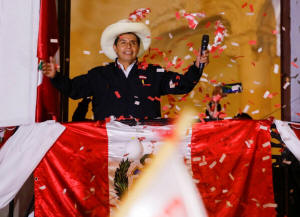Stashing cash, Peru's urban elite panics as a socialist looks set to
clinch presidency
 Send a link to a friend
Send a link to a friend
 [June 15, 2021]
By Marcelo Rochabrun [June 15, 2021]
By Marcelo Rochabrun
LIMA (Reuters) - In Peruvian capital Lima,
fear is spreading among the city's small but powerful urban elite about
the likely election win of a little-known socialist teacher.
Pedro Castillo is poised to be named president ahead of conservative
rival Keiko Fujimori. With almost all votes tallied , Castillo's lead
over Fujimori is narrow but looks to be enough, though the final result
could take days or even weeks as legal challenges play out.
During campaigning, Castillo pledged to sharply hike taxes on mining in
the world's no. 2 copper producer to pay for social spending and redraft
the constitution to give the government more muscle in running the
economy. He has also hinted at potential land reforms.
Fujimori's conservatives were quick to play up fears about the rise of
"communism" and to stir up old ghosts of land grabs and a
Venezuela-style collapse. Lit-up signs appeared in the capital warning,
"Think about your future, say no to communism." They did not mention
Castillo by name and no-one has claimed responsibility.

"(Castillo's) party is Marxist-Leninist. He says he will change the
constitution, that he will carry out expropriations. So if he does all
that, it shouldn't come as a surprise," Alfredo Thorne, a former finance
minister, told Reuters.
As his victory looked more likely in recent weeks, Castillo softened his
rhetoric, rebuffing comparisons to authoritarian leftists like
Venezuela's Hugo Chavez. He has brought on board more moderate advisers,
played up a pro-market message, and denied that he plans to
nationalize or expropriate savings.
However, many in the wealthy parts of Lima - which overwhelmingly voted
for Fujimori - are still fearful.
"All of my friends have taken their money abroad, I don't know anybody
who hasn't withdrawn their money," said an attorney in the city who
serves on the boards of several large corporations and had also
withdrawn funds.
"I wouldn't keep any money in Peru, not a penny," the attorney added,
asking not to be named because of sensitivities about the political
situation.
The sol currency has fallen 8% since Castillo was the surprise winner of
an April 11 first-round vote, while the Peru select equities index is
down some 9% over the same period, with banks and mining shares among
the hardest-hit.
Analysts say, however, that a fragmented congress will limit radical
change and force Castillo to be pragmatic, which could even create a
silver lining for markets and potential buying opportunities for
investors.
'COLLECTIVE HYSTERIA'
The collective fear appears to be real, whether or not it is warranted.
Some families are splitting properties among members or putting them in
trusts, the attorney said, and even in some cases resorting to
withdrawing cash in briefcases to store at home.
Banks have been importing physical dollar bills in order to meet the
demand, according to two sources with knowledge of situation.
[to top of second column]
|

Peru's presidential candidate Pedro Castillo addresses supporters
from the headquarters of the "Free Peru" party, in Lima, Peru June
8, 2021. REUTERS/Sebastian Castaneda

"The goal of importing dollar bills is to increase
availability, in case there are people who need a larger amount of
cash," said one of the banking sources, adding that Peruvian lenders
have high liquidity and deposits are not at risk.
"It's collective hysteria," said Ramiro Llona, a prominent artist
who been critical of Fujimori, the daughter of divisive former
President Alberto Fujimori. Llona said that fear and bias was
driving some of the push-back against Castillo, the son of peasant
farmers from Peru's rural north.
"I strongly belief that there is a component of racism at play
here... fear that a person from the Andes might win."
Whereas 88% of residents in the capital's San Isidro, Peru's richest
neighborhood, voted for Fujimori, in Peru's poorest Andean region,
Huancavelica, 85% supported Castillo. He has galvanized support
among those left behind like no other politician in recent
decades.
Reuters spoke to half a dozen wealthy Lima residents who said
support for Fujimori was rooted in two historical traumas - land
appropriations in the 1960s and hyperinflation in the 1980s, both
under leftist leaders.
"The ones with the old-money fortunes are the ones who are dying of
fear," said a senior consultant who serves Peru's largest
corporations, asking not to be named.
Those among the elite who have spoken out against Fujimori have
found themselves ostracized.
"Being anti-fujimorista in this runoff election was like having
leprosy," said Ursula Castrat, a podcast presenter and former editor
at Cosas, a magazine that chronicles the lives of the upper classes.
She vocally opposed Fujimori on social media.
Llona, the artist, said his wife had come under pressure from
friends to get him to tamp down criticism of Fujimori.
Castrat also said her friends pressured her to support Fujimori.

"I ended up voting for Fujimori as a gift to one of my best
friends," Castrat said. "I had already bought her a present but she
insisted, so I took a photo of my ballot and sent it to her."
(Reporting by Marcelo Rochabrun; Editing by Adam Jourdan and Rosalba
O'Brien)
[© 2021 Thomson Reuters. All rights
reserved.] Copyright 2021 Reuters. All rights reserved. This material may not be published,
broadcast, rewritten or redistributed.
Thompson Reuters is solely responsible for this content. |